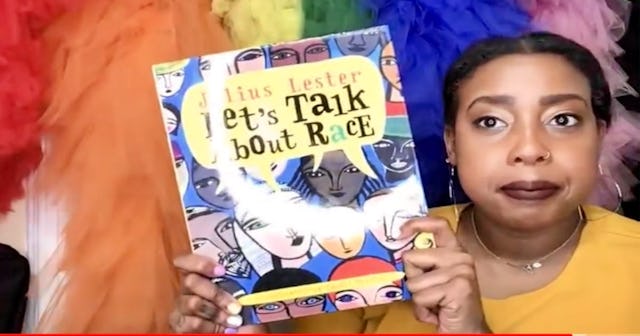Kindergarten Teacher Breaks Down Racism And Activism In A Viral Video

Brooklyn-based kindergarten teacher Vera Ahiyya knew she had to do something. Since she is unable to meet with her students in person because schools are closed due to the coronavirus pandemic, she wondered how she could converse with them about the topic of racism. She would frequently engage with her diverse group of students in the classroom, helping them process and understand tough subjects that they might have trouble naming and grasping. Currently, many people are talking and thinking about George Floyd, Ahmaud Arbery, Breonna Taylor, protesting, police brutality, statues, and racial equity. With the support of her school administrators, she created a video addressing racism and activism—one that went viral.
Ahiyya, who is known as the Tutu Teacher on social media, opens her video by telling her viewers that COVID-19 is one disease, but society is also “combating” another disease: racism. She said, “Racism is everywhere, and it’s our job to stop it.” She explains that the fight against racism has been taking place for over four hundred years, and reminds her viewers of some famous people who have fought racism including Rosa Parks and Dr. Martin Luther King, Jr. Then she offers viewers action steps.
Her use of the collective “our” is powerful. She reminds not only her own students, but every person watching her, that we each have a decision to make. She shared, “You have a choice, you have a voice, to say, ‘This is wrong.’” By standing up, we can “impact the lives of a lot of people.” She also said, “Lots of Black people really need your voice.”
She offers ways that young viewers can use their voice to stand up to racism. They can write letters, speak up, and ask their family and friends questions to discover even more ways to help. She proceeds to read the book Let’s Talk About Race by Julius Lester.
Unfortunately, many white parents choose not to talk about race with their children because they feel their kids are too young and not ready for such conversations. They fear that by telling their children the truth and addressing racism directly, they will somehow harm their children. The parents’ own discomfort with race and their lack of racial literacy stops them from talking to their kids. Instead, they lean on “colorblindness” and vague messages of “be nice and inclusive.” Some also believe that because they have one Black friend, co-worker, or neighbor, that there’s no way they could host racial biases and therefore, don’t need to bother getting educated.
As a white parent of four Black children, I’ve heard many explanations as to why race and racism discussions shouldn’t happen from other white parents. My family’s reality is different. My children have learned from a very early age that they are Black and that Black is beautiful and magical. We have race conversations daily. My kids also know that because of racism and stereotypes, they have rules that their white friends do not have, such as not putting their hands in their pockets or wearing their hoods up in a store. We lean on the advice and influence of Black friends on how to talk to our children and why it is important.
When I hear white parents make excuses, they just don’t hold up, especially not now. The problem, of course, is that not talking to children or sugar-coating doesn’t eradicate racism. In fact, it only perpetuates it. The problem needs to be named and confronted in order for positive, productive change to happen.
Ahiyya told Scary Mommy, “Non-Black families must get comfortable with being uncomfortable. Children are ready and capable of having these conversations early. Racism is real and it disproportionately negatively affects the lives of Black and brown children.” She acknowledges that yes, these conversations are uncomfortable and vulnerable, and parents will make mistakes. But newsflash: that isn’t their ticket to give up and do nothing.
There are plenty of anti-racism resources for adults so they can do the self-work necessary to then in turn teach their children. She shared, “Non-Black parents should be talking with their children about racism every day because for Black families it is an inescapable part of our everyday existence.” She implores parents to ask questions such as: What is one way we can use our voice today? What is one book we can read to help us learn? What can we create or do to help to be a better ally? How do I make space for the Black people in our lives?
Ahiyya encourages “consistent and constant conversations about race.” Her video is an excellent jumping point for parents who start talking to their younger children. There are numerous books, podcasts, movies, documentaries, articles, and even music that address the many facets of racism. Simply put, there is no excuse for not doing the work within your own family. There are many readily-available resources, more than ever before. For children, Ahiyya likes books including I Am Every Good Thing by Derrick Barnes, The Undefeated by Kwame Alexander, Something Happened In Our Town by Marianne Celano, and Stamped by Jason Reynolds and Ibram X. Kendi (for older kids).
https://www.instagram.com/p/CBTYrYPBINH/?utm_source=ig_web_copy_link
Ahiyya ends her video with a message of hope and direction for her young viewers. She shared, “The only way for things to get better and to change is to do this together. So, my friends, will you help me?” As Maya Angelou famously shared, know better, do better.